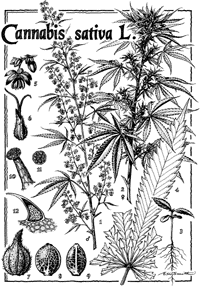Medical Marijuana Advocate
Faces New U.S. Indictment
By CAROLYN MARSHALL SAN FRANCISCO, Oct. 13 — A leading medical marijuana advocate who successfully appealed his federal conviction this year has been indicted on new criminal charges that include tax evasion and money laundering.The man, Ed Rosenthal, a well-known spokesman for the movement to legalize marijuana, was already facing a retrial on federal charges of growing marijuana for medical use. He is to be arraigned Monday in Federal District Court here on the new indictment, unsealed late Thursday.
It accuses Mr. Rosenthal, 61, of 14 felony charges that include cultivating marijuana plants; laundering $1,850, which the government says he got from selling the plants to medical dispensaries; and tax evasion. His tax returns, prosecutors said, omitted income from the sale of the plants.
Reached Friday at his home in Oakland, Mr. Rosenthal said he thought the efforts to prosecute him were part of a campaign to shutter medical marijuana sites in California and to subvert the state law allowing them.
“They want to shut me up,” he said. “They are vindictive. They don’t like anybody beating them, and they will go after you again and again until they wear you down.”
The state and the federal government have been locked in a legal and cultural battle over the medicinal merits of marijuana since 1996, when California voters approved a ballot measure giving seriously ill patients the right to buy and use the drug with a doctor’s prescription.
The Drug Enforcement Agency has been aggressive in investigating medical marijuana facilities. Last week, the authorities raided and closed five Bay Area sites, arresting 15 people.
A spokesman for the United States attorney’s office, Luke Macaulay, would not comment on the new indictment, but said, “Drugs are a priority for the Justice Department, being that marijuana is illegal under federal law.”
The new charges against Mr. Rosenthal are similar to those in a 2002 federal indictment. At the time, Mr. Rosenthal worked for the City of Oakland and was sanctioned under city and state laws to grow marijuana plants and sell them to dispensaries. He was convicted by a jury, but a federal appeals court overturned the decision, citing juror misconduct. He was granted a new trial, and prosecutors were moving forward, but the new federal indictment supersedes the earlier one.

